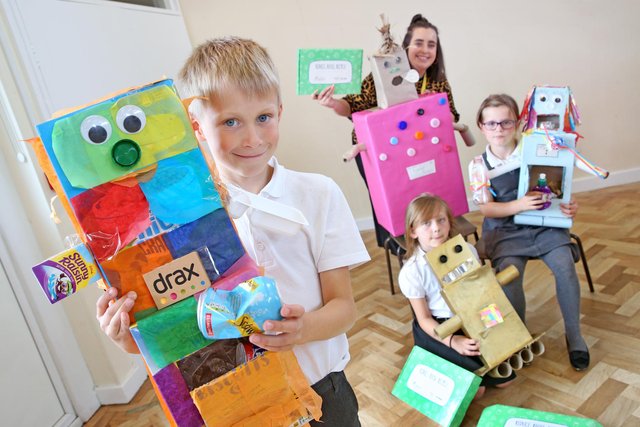Posted: 21/07/2021

Doncaster Children’s University (CU), a part of Doncaster College and University Centre, has been working with the Visitor Centre Team at Drax power station to develop a brand-new project that aims to engage children with the subject areas of Science, Technology, Engineering, and Maths. Together they have produced the STEM box project.
As part of this project, students at Sunnyfields Primary School in Scawthorpe were provided with activity boxes containing games, resources, and the materials they needed to build their very own robots with a focus on recycling. Students made their robots from readily available recyclable materials, such as cereal boxes, toilet roll tubes, plastic bottles, tin cans, and more. They made their robots to carry out recycling tasks such as having magnetic hands to pick up metal, or built-in compartments to store paper.
During the Covid-19 lockdown, many pupils have struggled to engage with home-schooling and projects like the STEM box provide a valuable opportunity to transition back into the school routine and get students enthusiastic about learning again.
Liane Clark from Children’s University at Doncaster College said, “Children’s University are excited to share this fantastic project with our CU schools to create an enriching learning experience that will inspire our future working generation. Our partnership with Drax has enabled a unique learning opportunity, which we hope will encourage children to deepen their knowledge and have a positive impact on their future.”
Drax Group’s Head of Sustainable Business, Alan Knight, said: “By providing schools with these resources we hope to further students’ understanding of the importance of recycling and hopefully fire up their imaginations and inspire them to study STEM subjects by showing them the wide range of career options that are available.”
Children at Sunnyfields Primary School are the first to take part in this project with the Doncaster CU and the Drax Power Station Visitor Centre Team, and there are plans to roll out to other schools across the region after the summer holidays.
Teacher Chloe Hoogwerf said: “The students had a great time taking part in the STEM box programme, learning about Drax, and building the recycling robots. Activities like these are so important as it really brings the subject to life and gets students enthusiastic about STEM, as well as encouraging them to start thinking about careers they might enjoy in the future.”